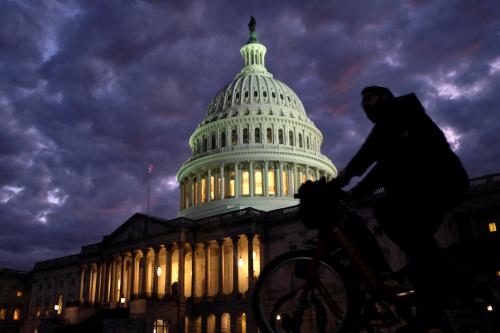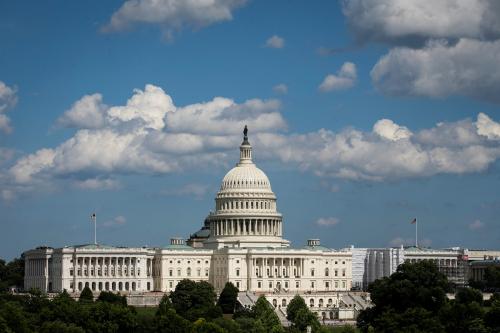Although public opinion doesn’t determine the outcome of impeachment trials, it shapes the environment within which senators must decide. Based on multiple polls conducted during the past month, here are five key facts about Americans’ sentiment as Donald Trump’s second Senate trial looms.
With former president Trump’s trial set to begin in the Senate, a clear but not overwhelming majority of Americans favor removing him from office. In surveys conducted by 6 different polling organizations between January 10 and February, support for his removal averaged 52%, while 42% were opposed.[i]
There have been no clear trends in public opinion in the month since the assault on the U.S. Capitol on January 6. One of the earliest surveys, conducted by Quinnipiac University between January 7th and 10th, found 52% favoring removal and 45% opposed. The next Quinnipiac poll (January 15-17) reported a 54-42 split, while the latest (January 28-February) put it at 50-45. Similarly, a comparison among the different polling organizations found no trend. It appears that most people made up their minds early on and haven’t changed them.
Although many observers believe that the case against Mr. Trump is significantly stronger than it was in his first impeachment trial, the share of Americans who want to see him convicted is only modestly higher than it was a year ago. Between December 18, 2019, when the House impeached then-President Trump for the first time, and on February 5, 2020, when the Senate acquitted him, support for removing him from office averaged between 46.4 and 48.5%. This was between 4 and 6 points lower than the average in support of conviction during the past four weeks of this, his second impeachment trial.
Support for barring Donald Trump from future public office, which averages 56%, is somewhat higher than for just convicting him. The Monmouth University survey found that when respondents who opposed conviction but favored barring him from office were told that he could not be barred unless he was convicted, support for conviction rose from 52 to 55%. With 56% of the public wanting to bar him from public office, Trump will face steep odds against regaining the presidency in 2024, even if he is acquitted.
Patterns of support for convicting or acquitting Mr. Trump closely mirror the divisions that prevailed throughout his presidency. Nearly all Democrats support conviction, while nearly all Republicans opt for acquittal. Non-whites favor conviction more than whites, women more than men, and whites with college degrees more than whites without them. According to Quinnipiac, the gender gap among white Americans was a stunning 23 points: 56% of white women favored conviction, compared to just 33% of white men.
As we begin Trump’s second impeachment trial, it is hard to distinguish judgments about convicting him from judgments about the Trump presidency and Trump the man. The share of Americans who support convicting him is almost identical to the share who ousted him from office by voting for Joe Biden. Seventeen Republican senators would need to join all the Senate Democrats to convict Trump in his second trial. But so long as Senate Republicans from red states fear the wrath of their voters if they break ranks, few are likely to do so. The court of public opinion will have to move more strongly in favor of conviction to influence wavering Republicans, and so far, there’s scant evidence that this will happen.
[i] Sources: Monmouth University, The New York Times, Times of San Diego, Politico, CS Monitor, Quinnipiac University







Commentary
Should the Senate convict Donald Trump? Here’s what the American people think
February 5, 2021